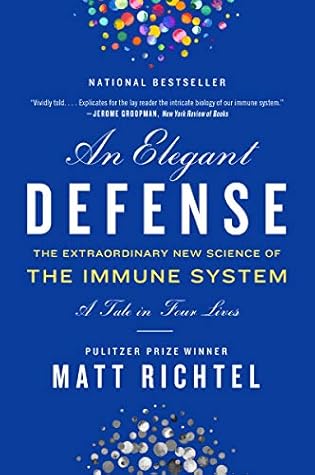More on this book
Community
Kindle Notes & Highlights
by
Matt Richtel
Read between
September 17 - September 20, 2021
This is of note in that it shows a different side of the macrophages. These “big eaters” also play a role in stimulating the growth of new tissue.
The trouble is that when the DNA is damaged, the new cells that grow can be malignant cells, some that are made up of self but that are different enough to behave like a cancer.
When a wound occurs—an insult, as it is known in scientific circles—cells divide. Of course they do. New tissue is needed. But when new cells divide, there is always a chance something can go wrong.
More injury means more cell division and, simply, more opportunity for dangerous mutation to occur.
Those of us who do not engage in such high-risk behaviors are much less likely to get cancer, or rather, we’re not as likely to get it as quickly. But if we live long enough, math will catch up with us too.
It is willing, in the short term, to risk a mutation taking hold in order to allow for the immediate rebuilding of tissue.
The dendritic cell acts as an intermediary between a potential pathogen and a T cell.
The more diversity we have—physically, spiritually, intellectually—the better our balance. Just as in the immune system and microbiome. More diversity, more tools.
If you doubt this, just ask yourself why we don’t allow incest. Such behavior leads to a narrowed gene pool, and survival rates plummet.
A culture, tone-deaf in its own defense, attacks so aggressively that it puts itself at serious risk.
Alzheimer’s was the sixth leading cause of death in the United States. It’s part of the immune story. This is what happens when you live longer. Eventually, your brain fails, even as your body goes on.
Astrocytes look like big stars. They play a critical role in helping the synapses communicate by enveloping them—a single astrocyte can envelop millions. “Astrocytes are orchestrators,”
Oligodendrocytes help the neurons conduct faster signals. I think of them as speed amplifiers for your brain’s internal communications network, like a Wi-Fi booster that brings the signal farther faster.
Then there are microglia. “They are the immune cells of the central nervous system,”
we are pulling back sharply on the use of antibiotics so that the element that saves us doesn’t lead to civilization-threatening pandemic.
The best examples are those over which we have complete control: sleep, exercise, meditation, and nutrition.
The less toxic the things you put into your body, the less likely your body is to create, or need to create, an inflammatory response.
The upshot of the research is that exercise slows the natural aging process of the immune system.
the immune system hasn’t evolved to defend us as individuals. It has evolved to defend our genetic material and the species as a whole. It does an extraordinary job of keeping us alive until we reproduce and then rear our offspring. After that, it does an even better job of moving us out of the way.
“You don’t want to live forever, but you do want to be healthy when you’re old.” This is what all these inventions and innovations have provided us: a bit more life and a whole lot more comfort as we age. Less pain, anxiety, disabling disease. Less fragility.
We must continue to strive, dream, and exercise all the passions that have gotten us this far, while also doing a much better job of accepting death.


